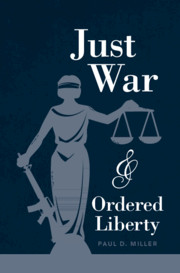Book contents
- Just War and Ordered Liberty
- Just War and Ordered Liberty
- Copyright page
- Dedication
- Epigraph
- Contents
- Acknowledgments
- 1 Thinking about War
- 2 The Augustinian Tradition
- 3 The Transition
- 4 The Westphalian Tradition
- 5 Competing Visions of a Liberal Tradition
- 6 Augustinian Liberalism
- 7 Just War and Ordered Liberty
- 8 Case Studies
- 9 Conclusion
- Works Cited
- Index
- References
Works Cited
Published online by Cambridge University Press: 08 January 2021
- Just War and Ordered Liberty
- Just War and Ordered Liberty
- Copyright page
- Dedication
- Epigraph
- Contents
- Acknowledgments
- 1 Thinking about War
- 2 The Augustinian Tradition
- 3 The Transition
- 4 The Westphalian Tradition
- 5 Competing Visions of a Liberal Tradition
- 6 Augustinian Liberalism
- 7 Just War and Ordered Liberty
- 8 Case Studies
- 9 Conclusion
- Works Cited
- Index
- References
- Type
- Chapter
- Information
- Just War and Ordered Liberty , pp. 254 - 262Publisher: Cambridge University PressPrint publication year: 2021



